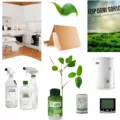Composting is a fantastic way to reduce household waste and contribute to a healthier environment. Whether you have a sprawling backyard or a small balcony, there’s a compost bin that fits your needs. In this article, we’ll explore the best compost bins for eco-friendly waste management, helping you make an informed decision for your sustainable lifestyle.
Why Composting is Important
Composting offers numerous benefits, from reducing landfill waste to enriching your soil with valuable nutrients. By composting organic waste, you not only cut down on the amount of trash you send to the landfill but also create a natural fertilizer that can support your garden’s growth. This practice is a key component of sustainable living, promoting a circular economy where waste is transformed into a valuable resource.
Types of Compost Bins
There are several types of compost bins to choose from, each with its own set of advantages. The main types include:
- Outdoor Compost Bins: Ideal for those with ample outdoor space, these bins can handle large amounts of organic waste and are often designed for easy aeration and mixing.
- Indoor Compost Bins: Perfect for apartment dwellers or those with limited outdoor space, these bins are compact and often include odor-control features.
- Tumblers: These bins are designed to make the composting process faster and more efficient by allowing you to easily rotate and mix the compost.
- Worm Composters: Also known as vermicomposters, these bins use worms to break down organic waste, producing high-quality compost known as worm castings.
Top Compost Bins for Eco-Friendly Waste Management
Here are some of the best compost bins available on the market today, each offering unique features to suit different needs:
1. Envirocycle Mini Composter
This compact tumbler is perfect for small spaces, offering a simple and efficient way to compost your kitchen scraps. Its design allows for easy rotation, speeding up the composting process.
2. FCMP Outdoor IM4000 Tumbling Composter
This durable and easy-to-use tumbler is ideal for larger households. Its dual-chamber design allows for continuous composting, meaning you can add new waste while the other chamber finishes composting.
3. VermiHut Plus 5-Tray Worm Compost Bin
Perfect for indoor use, this worm composter is designed to maximize the efficiency of vermicomposting. The stackable trays make it easy to manage and harvest worm castings.
4. Utopia Kitchen Stainless Steel Compost Bin
This sleek, odor-free bin is perfect for keeping on your kitchen counter. Its charcoal filter ensures that no unpleasant smells escape, making it ideal for indoor use.
How to Choose the Right Compost Bin
When selecting a compost bin, consider the following factors:
- Space: Assess the amount of space you have available. Outdoor bins are suitable for gardens, while indoor bins are better for apartments.
- Capacity: Choose a bin that can handle the amount of waste your household generates.
- Ease of Use: Look for features that make the composting process simple, such as easy rotation or stackable trays.
- Odor Control: If you’re composting indoors, opt for a bin with an effective odor control system.
Tips for Successful Composting
To ensure your composting efforts are successful, keep these tips in mind:
- Balance Greens and Browns: A good compost mix includes a balance of green materials (kitchen scraps, grass clippings) and brown materials (leaves, paper).
- Aerate Regularly: Turn your compost regularly to provide oxygen and speed up decomposition.
- Monitor Moisture: Your compost should be moist, but not too wet. Add water if it’s too dry and add dry materials if it’s too wet.
- Avoid Certain Materials: Do not compost meat, dairy, or oily foods as they can attract pests and create odors.
FAQ
1. What can I compost?
You can compost fruit and vegetable scraps, coffee grounds, eggshells, grass clippings, leaves, and paper products. Avoid meat, dairy, and oily foods.
2. How long does it take to make compost?
The composting process can take anywhere from a few months to a year, depending on the conditions and materials used.
3. Can I compost in an apartment?
Yes, you can use indoor compost bins or worm composters to compost in small spaces like apartments.
4. How do I know when my compost is ready?
Finished compost will be dark, crumbly, and have an earthy smell. It should not have any recognizable food scraps.
5. Do compost bins attract pests?
Properly managed compost bins should not attract pests. Avoid adding meat, dairy, and oily foods to minimize the risk.









